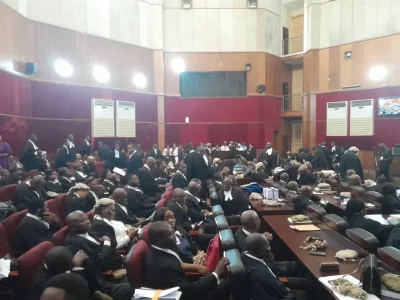Nigeria News
Moderator

The Presidential Election Petition Court has upheld the election of President Bola Ahmed Tinubu of the All Progressives Congress (APC), dismissing the petitions filed by Atiku Abubakar of the Peoples Democratic Party (PDP), Peter Obi of the Labour Party (LP), and Chichi Ojei of the Allied Peoples Movement.
The five-member panel of justices, led by Justice Haruna Tsammani, delivered a unanimous verdict after more than 12 hours of deliberation. They cited significant gaps in the three petitions, concluding that "all the petitions are devoid of merit and are hereby dismissed."
The Independent National Electoral Commission (INEC) had declared Tinubu the winner of the election on March 1, with 8,794,726 votes, while Atiku received 6,984,520 votes, and Obi received 6,101,533 votes.
The tribunal addressed key issues such as the majority of lawful votes, the requirement of two-thirds of votes cast, and the role of the Federal Capital Territory (FCT) in the election. It also ruled on the $460,000 forfeiture case in a US court against Tinubu, the double nomination issue, and the non-transmission of results.
The justices found that Atiku and Obi failed to provide sufficient evidence to support their claims of winning the majority of lawful votes and failed to specify where ballot boxes were allegedly snatched or how the BVAS machines were manipulated.
Regarding the LP's allegations of irregularities and suppression of votes in multiple states, the court held that the claims were non-specific and speculative.
The court also dismissed the argument that two-thirds of votes in 24 states and the FCT were required to be declared the winner, clarifying that the FCT should be treated as one of the states in such calculations.
Additionally, the court ruled that the $460,000 forfeiture in the US did not amount to a criminal conviction and did not disqualify Tinubu. The double nomination case and other pre-election matters were dismissed on procedural grounds.
The tribunal also concluded that there was no provision in the Electoral Act, INEC Manual, or Regulations that mandated electronic transmission of results, reinforcing the discretion of INEC in determining the best method for result transmission.
While President Tinubu welcomed the verdict, calling for collective efforts to build the nation, the PDP and LP rejected the judgment, citing violations of relevant laws and the constitution. The LP expressed dismay over the decision, stating that it did not reflect the law and the people's desire.
The APC commended the tribunal's thorough judgment and urged the PDP, LP, and others to accept the verdict. Deputy Senate President Barau Jibrin affirmed the tribunal's decision, emphasizing the need for collaboration to develop the country.
Constitutional lawyer Professor Auwalu Yadudu noted that the tribunal's judgment was explicit and detailed, making it difficult to fault. He believed the decision should put to rest the issue of the FCT's status in determining the presidential winner.
Despite the varying reactions, the tribunal's decision marks a significant moment in Nigeria's political landscape, prompting discussions about electoral reforms and the role of INEC in ensuring transparent elections.

